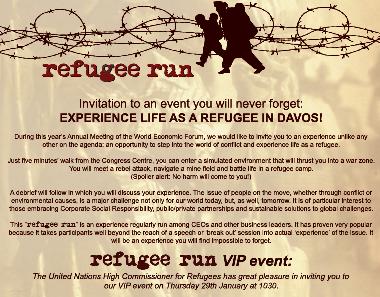Tuesday’s Financial Times printed a Martin Wolf interview with the Gateses from Davos, available as a video on the FT web site.
A sample quote from the interview:
We’re trying to make sure that people understand this: aid is effective…So, for instance, malaria incidence is down in countries such as Zambia, Ethiopia, and Rwanda. It’s down in some countries by over 50 percent and some by 60 percent…[if we and other donors] come in and distribute mosquito nets – 60m to date – that is how we have achieved these declines. So we are able to say, “Look, aid is making a huge difference, we are literally saving people’s lives."
Real victories against malaria would be great, but false victories can mislead and distract critical malaria efforts. Alas, Mr. and Mrs. Gates are repeating numbers that have already been discredited. This story of irresponsible claims goes back to a big New York Times headline on February 1, 2008: “Nets and New Drug Make Inroads Against Malaria,” which quoted Dr. Arata Kochi, chief of malaria for the WHO, as reporting 50-60 percent reductions in deaths of children in Zambia, Ethiopia, and Rwanda, and so celebrated the victories of the anti-malaria campaign. Alas, Dr. Kochi had rushed to the press a dubious report. The report was never finalized by WHO, it promptly disappeared, and its specific claims were contradicted by WHO’s own September 2008 World Malaria Report, by which time Dr. Kochi was no longer WHO chief of malaria.
(There was never a retraction in the New York Times, so perhaps Mr. and Mrs. Gates can be forgiven for being confused – although with most of the world’s public health professionals on Mr. and Mrs. Gates’ payroll you would think their briefers would have access to the most accurate information.)
The September 2008 WHO Malaria Report keeps Rwanda as a success story (along with some other new success stories – not mentioned in the New York Times – like Sao Tome & Principe and Zanzibar), but Zambia and Ethiopia are gone: the effects of malaria control in Zambia were “less clear,” and in Ethiopia, “the expected effects” of malaria control are “not yet visible.”
Digging deeper into the WHO Malaria Report, the standards for data on malaria are set so low, it is even more striking how the Kochi numbers – those numbers that fueled a February 2008 New York Times story and a February 2009 Gates claim – failed to meet even these low standards. The WHO says (in a small print footnote): “in most countries of Africa, where 86% cases occur, reliable data on malaria are scarce. In these countries estimates were developed based on local climate conditions, which correlate with malaria risk, and the average rate at which people become ill with the disease in the area.” Another stab at explanation of their malaria numbers was: “From an empirical relationship between measures of malaria transmission risk and case incidence; this procedure was used for countries in the African Region where a convincing estimate from reported cases could not be made.” (Possible translation: we make the numbers up.)
The shakiness of the numbers is visible when you look at them by country in the WHO Malaria Report. For the “success story” of Rwanda, there is an estimate of 3.3 million malaria cases in 2006, with an upper bound of 4.1 million and a lower bound of 2.5 million. But wait – another way to estimate cases, which is the one used to estimate trends, shows 1.4 million cases in 2006 (and this was an increase over the 2001-2003 average). Estimates of child malaria deaths in Rwanda are similarly all over the place – they do show a drop from 2001 to 2006, but the change is dwarfed by the vast imprecision conveyed by the lower and upper bounds.
In another WHO success, Zanzibar (which, to be fair, Mrs. Gates also mentioned as a success by in the interview), there seems to be more consensus on success from a combination campaign featuring indoor spraying of homes, insecticide-treated bed nets, and treatment of malaria patients with advanced drugs. It seems to be easier to make inroads into malaria on small islands. The American Journal of Tropical Medical Hygeine has published two articles suggesting there was success of malaria control in Sao Tome (also an island) and a corridor in South Africa, Mozambique, and Swaziland, apparently using more rigorous data methods.
As far as the country claims by the WHO and Mr. and Mrs. Gates, however, there seems to be mass confusion, and data that ranges from phony to made-up to shaky, about what interventions are responsible for what trends where. The WHO Malaria Report offers this ringing conclusion in its “Key Points” summary on how to control malaria:
In general, however, the links between interventions and trends remain ambiguous, and more careful investigations of the effects of control are needed in most countries.
Maybe the Gates Foundation should be funding more rigorous data collection. With all this effort to fight the tragedy of malaria, it’s even more tragic that the malaria warriors can’t even get accurate reports of who is sick and dying when and where.
 From Aid to Equality
From Aid to Equality



